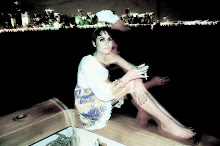

Because I was unable to carry the table to my apartment, a man at the furniture store strapped it to the bed of his truck and drove both me and the table the twelve or so blocks to my apartment. With furniture, it's just the surface you have to be careful of, but with people, unless it's a dead person's body, in which case it's more like furniture, there are all these invisible little things that can set them off, the little things related to bigger things, the big things like filters or warped glasses through which people perceive themselves and their surroundings. This, though not exactly, is what the man told me as we were driving, and while I thought the comparison between furniture and people was simple, I understood what he meant, that a person’s past experience alters how she perceives her present surroundings, whereas the experience of furniture is recorded primarily on its surface. Along the way, the man got lost while telling me about how much he enjoyed the job at the furniture shop after working for so many years as a driver, first of a limo, then of a hearse. I did consider and fear when choosing it that its structure was compromised in ways that would only be apparent later, when I wasn’t expecting it, though this has not happened yet as far as I am aware.
As I am writing my phone number and watching the just-inked numbers blur, he calls the work of another sculptor superficial, which is a word I don't like, because who's to say that what's below a surface is not another surface, that one is better than another? I liked to trace the ink marks on the off-white walls with my finger the way I liked to trace my parents' signatures, mimicking the loops and folds of their thoughts as they were writing, as if what's written is any indication of what the writer was thinking. When I knew him best was when I was in school, studying painting, and he was an assistant professor who let it be known that painting, while often subtle, is inferior to sculpture because it lacks a dimension, but I never knew him well, and didn't want to. This seemed like such a simple criticism, yet one he held to with conviction, and it became part of his reputation, which surrounded him like a vacuum. Other words that are similar to simple, and which I know I've used, perhaps unfairly: facile, surface, superficial.
Finally we part, he going into his building, me turning in a circle before setting out in a direction. Realizing that I was being watched and possibly mocked, I would press my skirt down though the feeling of baring my legs was alluring. I look into doorways for the comfort of seeing someone in the midst of entering or exiting, the door opening, the air of inside and outside exchanging, a mouth slightly open as if awaiting an answer or arriving at the beginning or end of a sentence, and I suppose I do this because I would like to be where they are, in their thoughts for a moment. I tipped the man and thanked him for moving my table, which I could not have done alone, and he said something that concluded what he'd started to say earlier but left hanging—pink faded gum in the corner of his mouth—while he negotiated parking in a too-small space by pulling forward and backward, over and over, pivoting the steering wheel about his palm, motions that make me think of the tortuous movement—false starts, circling, and backpedaling—that goes on in me while I negotiate difficult conversations, and often while I'm writing, which is like having a conversation with one's memory.
People want to give you directions, said the man helping me with my table, They want you to listen to their problems and do for them what they can't do for themselves, which is different for everyone, we all have different strengths and weaknesses, you might be able to do something I can't, but I can do something your neighbor can't, so power among people is constantly shifting, and I can't understand how any one person ever gets to a place of importance, though ignorance is rampant, and—












No comments:
Post a Comment